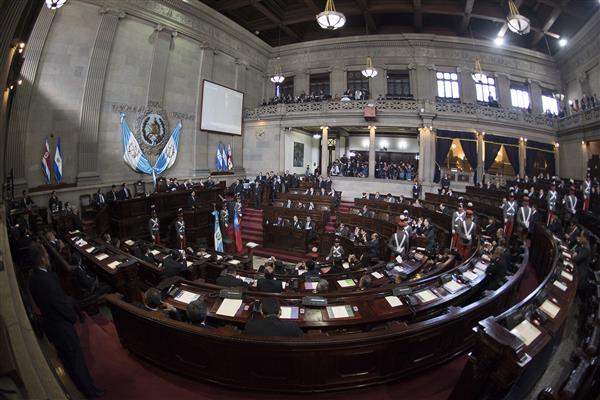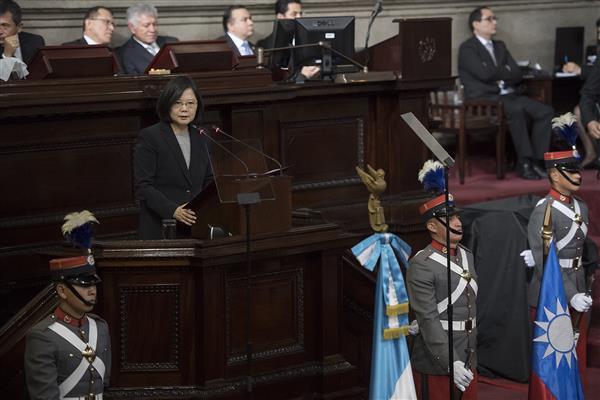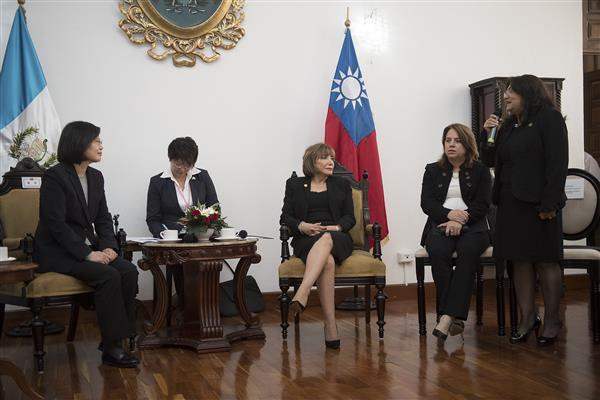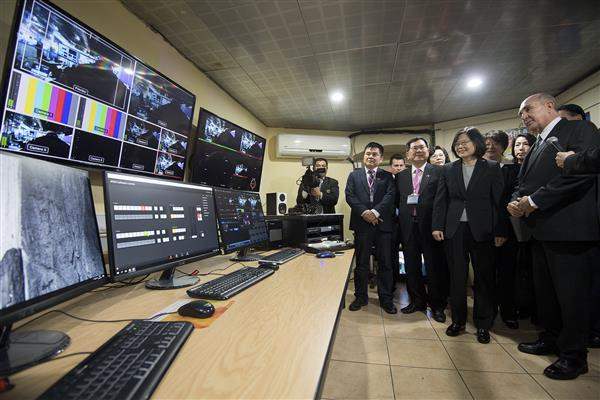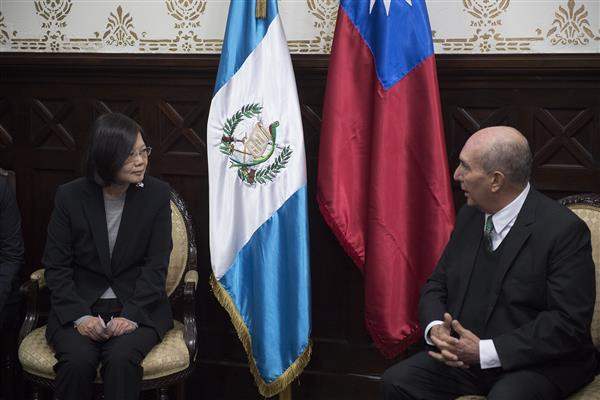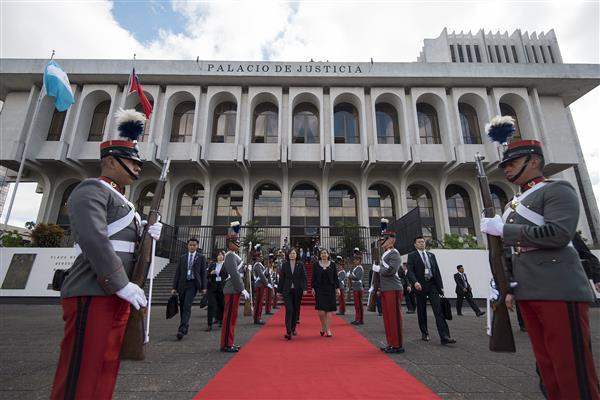News & activities
 News releases
News releases
At about 10:30 a.m. on Thursday, January 12 local time (12:30 a.m. on January 13 Taipei time), President Tsai Ing-wen went to the Congress of Guatemala to visit Guatemala Congressional President Mario Taracena Diaz-Sol and deliver an address in solemn session of the Congress.
After arriving, President Tsai first inspected transmission and filming equipment donated by the Taiwan government to Canal del Congreso, Guatemala's newly established congressional television channel, then proceeded to the television station's main control room to see the donated equipment in operation.
Prior to delivering her speech before Congress, President Tsai called on Congressional President Taracena and exchanged pleasantries. After that, members of the Guatemalan Congress accompanied the president into the legislative chamber. After the playing of the two countries' national anthems and welcoming remarks from Mr. Taracena, President Tsai delivered her address.
The following is a translation of the president's address:
First, on behalf of the government of the Republic of China and the 23 million people of Taiwan, I would like to extend my sincere thanks to the Guatemalan Congress and all of its members for inviting me to be here.
I thank all of you for allowing everyone in our delegation to take part in this solemn session of Congress and letting me deliver this address. Speaking on behalf of the people of Taiwan, I want to take this opportunity to convey our deepest respect for the people of Guatemala and the firm friendship between our two countries.
I think it is worth mentioning here that your Congressional President told me earlier my address would be broadcast via Canal del Congreso, your new congressional television station that has been established as the result of a cooperation project between Taiwan and Guatemala. It is my understanding that this is the first public broadcast by this system. This is a great honor for me.
This is the first time I've ever been to Guatemala, and I must say, the people, the scenery, and the colorful buildings that I've seen in Guatemala City and Antigua have left a very deep impression on me.
Yesterday I visited Antigua, which is designated as a UN World Heritage site. When Antigua was hit by a big earthquake a few years ago, a reconstruction team from Taiwan had the honor of taking part in the recovery effort, and they worked very hard. I feel certain that every Taiwanese person who took part in the recovery effort in Antigua will feel proud to see that Antigua is being steadily restored to its former beauty and is attracting large numbers of tourists.
I hope that my visit can afford more people in Taiwan the opportunity to see how beautiful Antigua is. Taiwan and Guatemala are located far apart geographically, but we have an unchanging friendship and shared values.
Our friendship, which dates back over 80 years, and the forces that hold it together, are most certainly not limited to diplomatic relations and official dealings. More importantly, it is our substantive exchanges and cooperation that have earned mutual trust and friendship among our peoples.
Over the past few years, our technical mission in Guatemala has promoted the planting of bamboo groves and shared tips with Guatemalan people on the many uses that can be made of bamboo. It can be used, for example, to construct strong, durable, and low-cost buildings. Bamboo buildings now serve as elementary school buildings in remote regions, and are thus helping to narrow the educational gap between urban and rural areas.
Our technical mission is also cooperating with the Guatemalan government on the Food Processing Project. With papayas, in particular, Taiwan's technical mission is providing guidance on cultivation, processing, and packaging techniques, and the Tainung No. 1 hybrid papaya has now become an important export product for Guatemala that brings in big foreign exchange earnings and generates a lot of job opportunities.
In addition to our substantive exchanges and cooperation, Taiwan and Guatemala also have many shared values. Most important among these is our commitment to democracy.
When I was being welcomed with military honors yesterday, I was invited to do the daily changing of the rose at the Monument of Peace at the National Palace of Culture. I deeply felt how terribly the Guatemalan people must have suffered as they struggled for freedom, democracy, and peace, and I felt a strong admiration for their unflagging determination.
The same is true of the people of Taiwan. We, too, lived through war and authoritarian rule before finally attaining the democracy and freedom we have today. We have both seen dark days in the past. And in both our cases, it was only our tenacious dedication to the ideal of freedom that gradually brought democracy and peace into the daily lives of our peoples.
We both firmly believe that people who have experienced suffering are certain to be all the more appreciative of the well-being they enjoy. The past experience of the Guatemalan people is very unfortunate, but we both believe that if we learn the lessons of history, a better future will certainly await.
In terms of both our shared values and our substantive cooperation, the friendship between Taiwan and Guatemala is firm and stable.
For many years, Guatemala has spoken up on Taiwan's behalf in the international community. On behalf of the government of the Republic of China, I thank Guatemala. Taiwan's path to engagement with the world has many detours and difficulties, but we stick resolutely to it.
After my inauguration as president in May of last year, I adopted a new diplomatic strategy of "steadfast diplomacy based on strengthening mutual assistance for mutual benefits." I hope to use substantive cooperation to contact our diplomatic allies and discuss mutually beneficial projects that more closely meet the needs of both sides.
Over the past few years in Guatemala we have worked via the Overseas Engineering & Construction Company to help widen Highway CA-9. We are motivated to do this because we believe that building infrastructure spurs economic and industrial development, and makes for a more prosperous society.
And beyond helping with infrastructure development, we also work to help Guatemala cultivate human resources. There are now 51 students from Guatemala studying in Taiwan under the Taiwan Scholarship Program or with support from our International Cooperation and Development Fund. These students are front-line people-to-people ambassadors who are helping to enhance our bilateral friendship.
In order to help improve education and health in Guatemala, we have brought student book bags with us and want to donate them to be used by students here. And we've also brought various medicines in the hope that they can contribute to better public health in Guatemala.
At the same time, we have already begun evaluating the possibility of launching a new project to provide medical care for pregnant women and newborns in order to reduce the risks faced by mothers and infants, and to provide support and training systems that will afford Guatemalan healthcare workers the opportunities to take part in more cooperation and exchanges with Taiwan, and even receive training in Taiwan.
With regard to trade ties, Taiwan and Guatemala signed a free trade agreement in 2006, and in 2016 our two-way trade amounted to about US$250 million, while Taiwanese investments in Guatemala topped US$100 million. Guatemala's most important export to Taiwan is coffee. Guatemalan coffee is easy to find pretty much anywhere in Taiwan, and the quality is world-class.
While visiting in Central America over the past few days, I've met for talks with Honduran President Juan Orlando Hernandez, Nicaraguan President Daniel Ortega, and your President Morales. I've come away from these talks with the feeling that the countries of Central America have excellent development potential and a strong desire for prosperity.
In line with the spirit of "steadfast diplomacy," Taiwan hopes to join hands with Guatemala and continue to devise mutually beneficial projects. I understand that Central American countries attach considerable importance to the automation of manufacturing processes, processing of agricultural products, green energy, logistics, economic infrastructure development, textiles and apparel, and digital communications.
As it happens, these are industries that Taiwan is also very interested in right now. It was with these industries in mind that we decided to invite a group of business leaders to join our delegation on this trip. I have always believed that personal experience is the most important aspect in terms of our policy of "steadfast diplomacy."
I also hope that after everyone has had a first-hand look at Central American markets, they will have a more fully developed idea about how the industries of the future need to go about establishing a global presence. And I hope that, in the midst of a changing world, Taiwan's industries will find more opportunities and solutions.
Beginning this year, we will periodically help Taiwan's business community to form investment and procurement missions, and I hope this approach will continue to enhance our bilateral economic and trade relations.
In addition, I also hope that Taiwan's diplomacy will come to be shaped by a wider range of intellectual approaches. Working in line with the principle of mutual assistance for mutual benefits, we need to engage in more discussions with our diplomatic allies and identify more cooperation projects that are new and mutually beneficial.
In the digital communications industry, for example, we have world-class companies and talent, and in recent years we've been actively working to narrow the digital divide.
I hope we can establish a new model for international cooperation. I hope that technological development won't just be one aspect of our government's cooperation projects; it would also be good if, while working on cooperation projects, we could also be looking for new markets to embark upon.
Our delegation, for example, includes representatives of Taiwan's high-tech firms. I hope that we can donate cloud-based digital education systems. Such systems are special not just for their hardware, but also because they come as part of a package that includes cooperation projects to provide ongoing training and education.
Taiwan is building up its digital education capability and laying the foundation for coding education, which Taiwan will soon include in its school curricula. We hope that by having teachers from Taiwan and Guatemala go through the same teacher training programs, in the future children in Guatemala who receive instruction in the use of computers will have the chance to learn coding.
I am aware that the effort to narrow the digital divide is time-consuming and difficult, but we shouldn't shrink from doing what is right just because there are difficulties. Taiwan will seize upon every opportunity to contribute to the international community, so that the world will see our determination to be engaged.
In closing, on behalf of the people of Taiwan, I want to once more thank Congressional President Taracena and all the assembled members of Congress. Taiwan deeply cherishes its friendship with Guatemala and hopes that, with the support of the Guatemalan Congress, our two countries can continue to assist each other and enjoy diplomatic ties that grow stronger with each passing year. I also want to express my wishes for good health and good fortune to Mr. Taracena, all the members of Congress, and the distinguished guests.
After concluding her address, President Tsai signed the congressional guest book and penned a Chinese phrase: "Strive for democracy, pursue freedom." The president's address before the Congress was also streamed on the website of the Guatemalan Congress and broadcast live by Claro TV.
Prior to their arrival at the Guatemalan Congress, President Tsai and her delegation visited the Guatemalan Supreme Court and engaged in a wide-ranging discussion regarding the two countries' judicial systems.








